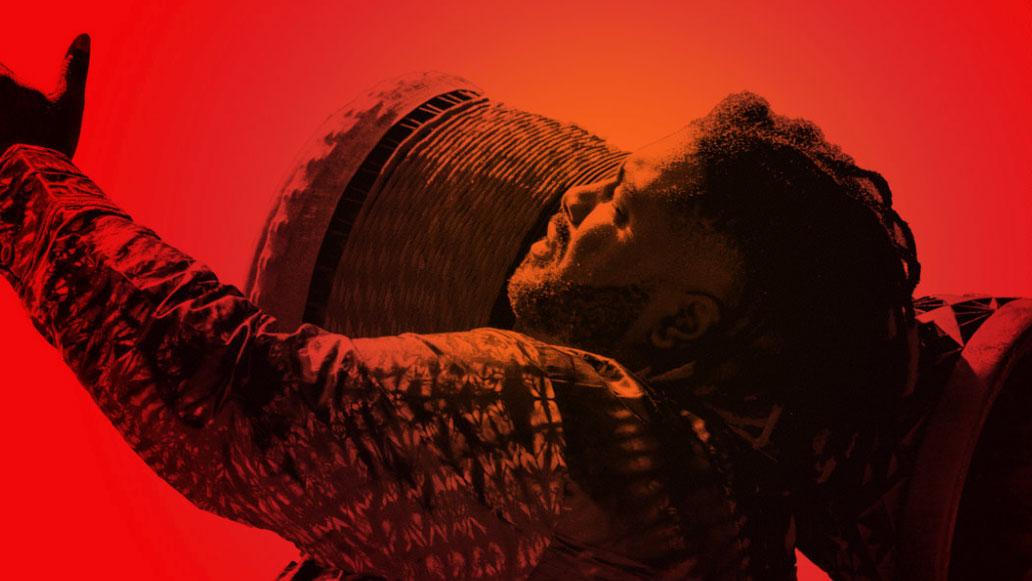Weedie Braimah is on a mission to let the djembe drum speak for itself.
The goblet-shaped hand drum originated in present-day Mali more than four centuries ago. Today, the drum has become an international symbol of African music.
As a djembefola — one who speaks through the drum — Braimah works to expand the boundaries of his instrument without sacrificing its identity and heritage.
Related: Gil Scott-Heron ‘was first and foremost an activist,’ fellow poet says
With his new album, “The Hands of Time,” — his debut recording as a bandleader — he puts the djembe at the forefront of his band.
“I’m a djembefola and I am one that’s trying to make this instrument, the djembe, a respected — or, more respected — and sophisticated instrument, no different than your cello, the classical piano.”
“I’m a djembefola and I am one that’s trying to make this instrument, the djembe, a respected — or, more respected — and sophisticated instrument, no different than your cello, the classical piano,” Braimah said.
In “The Hands of Time,” Braimah and his band fuse hip-hop, folkloric music and jazz with the help of artists like rapper Maimouna Youssef, aka Mumu Fresh, and jazz trumpeter and composer Christian Scott Atunde Adjuah.
The new album tells two stories: that of the djembe and Braimah’s journey to it.
Related: Delgrès founder pays tribute to his family’s Guadeloupean roots through music
His musical roots run deep. His father, Oscar Sully Braimah, was a drummer from Ghana. That’s where Weedie was born and also where he learned to play the drum. When he was about 4, the family moved to the United States and settled in Illinois.
“My father started this band in Champaign-Urbana, called Bontuku. And in Champaign, there was a club they used to play at, called Nature’s Table. That was the first band I ever played with in my life,” Braimah said.
He recalls how his mother played the drums while his father played flute and wrote the music and also played folkloric drums. As a child, Braimah memorized every part.
“To hear that type of music as a 4-year-old and to be able to mimic and sing everybody’s parts. It used to freak my father and my mama out.”
“To hear that type of music as a 4-year-old and to be able to mimic and sing everybody’s parts, it used to freak my father and my mama out,” Braimah said.
Related: José González’s ‘Local Valley’ mixes sounds from West Africa, from the Sahel to Ghanaian highlife
He brings those horns and that energy into his new album.
The song “Back to Forward” is an ode to his late father. “When the Clouds Kissed 2/5/15” honors his late mother.
“She was the only one of her siblings who pursued music. And she played from looking up to her father — Nathaniel Weedy Morris. He played with everybody,” Braimah said.
The Morris family has deep roots in New Orleans, where Braimah lives now. But his grandfather eventually ended up in east St. Louis, which had a thriving music scene.
His mother enrolled Braimah in a program there as a kid to learn African music and dance. Her little boy was used to Ghanaian drums — and these drums in east St. Louis sounded different.
Today, Braimah wants to bridge the divide he sees between percussionists and drummers, which in many bands are seen as different roles — the drummer playing a drum kit.
“The more you start going east, you [the more you] start realizing that these ‘percussion instruments’ — that’s considered the spice of the music — it’s actually the melody of the music.”
“Now, that’s a Western trait,” Braimah explained, “because of the miscommunication and misunderstanding of what it is. The more you start going east, [the more you] start realizing that these percussion instruments — that’s considered the spice of the music — it’s actually the melody of the music,” Braimah said.
Braimah continues to play for the community events and classes that got him started.
But now, the Grammy-nominated artist’s djembe shows up in jazz and blues clubs, from New Orleans to New York.
With Braimah’s band and debut album — it’s his turn to speak.
The World is an independent newsroom. We’re not funded by billionaires; instead, we rely on readers and listeners like you. As a listener, you’re a crucial part of our team and our global community. Your support is vital to running our nonprofit newsroom, and we can’t do this work without you. Will you support The World with a gift today? Donations made between now and Dec. 31 will be matched 1:1. Thanks for investing in our work!
